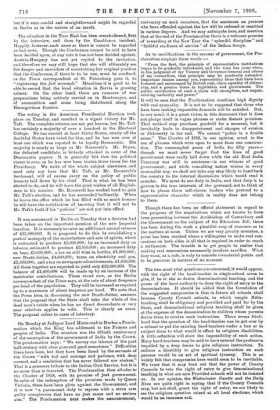As to modifications in the manner of government, the Pro-
clamation employs these words :—
" From the first, the principle of representative institutions began to be gradually introduced, and the time has come when, in the judgment of my Viceroy and Governor-General and others of my counsellors, that principle may be prudently extended. Important classes among you, representing ideas that have been fostered and encouraged by British rule, claim equality of citizen- ship, and a greater share in legislation and government. The politic satisfaction of such a claim will strengthen, not impair, existing authority and power."
It will be seen that the Proclamation combines high dignity with real sympathy. It is not to be supposed that those who have been making impossible demands will be satisfied. But, to our mind, it is a great virtue in this document that it does not pledge itself in vague phrases or make distant promises. That method may purchase goodwill for a moment, but it
inevitably leads to disappointment and charges of evasion or dishonesty in the end. We cannot "palter in a double sense." The Charter of 1858, in our opinion, erred in the use of phrases which were open to more than one construc- tion. The unexampled peace of India for fifty years—
though we must never forget that the lines of good government were really laid down while the old East India Company was still in existence—is oar witness of good government; and while consulting native wishes in every reasonable way, we shall not take any step likely to hand back the country to the internal dissensions which would rend it
asunder. We must do our duty in India, and that duty is to govern in the true interests of the governed, not to think of how to please those self-chosen leaders who pretend to a representative character which in reality does not belong to them.




























































 Previous page
Previous page